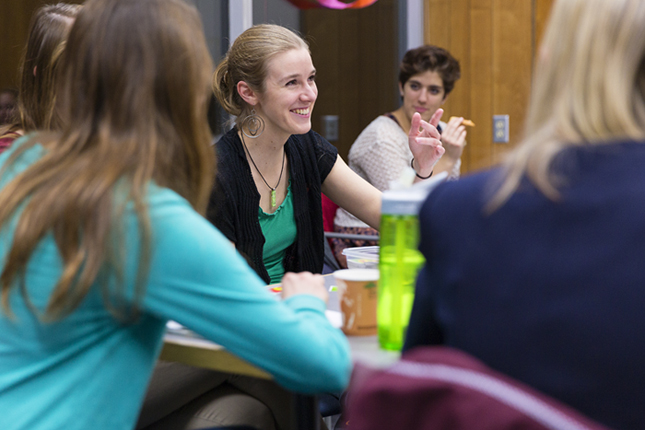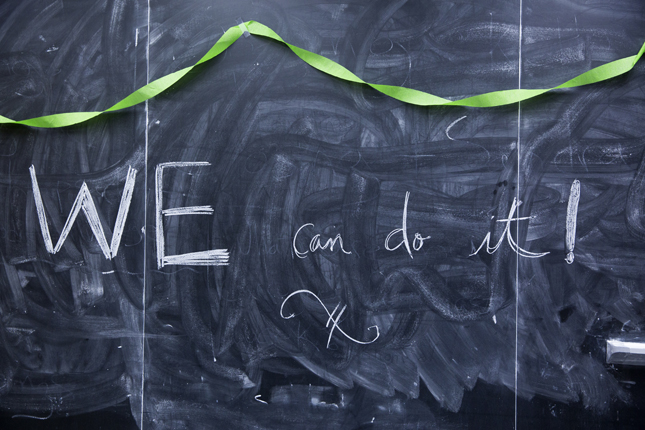
Sara King couldn’t quite believe her eyes when she walked into her discussion section for an intermediate economics course a few semesters back.
Of the 40 or so students in the classroom, she was the only woman.
“I got a crash course in learning ‘bro’ talk that semester,” she jokes.
Economics has long been a male-dominated field, and the University of Wisconsin-Madison reflects that imbalance. Women account for about 28 percent of undergraduate economics majors on campus, a number that’s actually slightly higher than the national average.
But the UW-Madison Department of Economics — home to one of the largest undergraduate majors at the university — is working to address the issue. It is one of 20 departments across the country participating in the Undergraduate Women in Economics Challenge, an experiment designed to uncover ways of encouraging young women to study the subject and succeed in doing so. The project was created by Harvard economics Professor Claudia Goldin and funded by the Alfred P. Sloan Foundation through the National Bureau of Economic Research.
The number of women majoring in economics at UW-Madison is actually the highest it’s been since undergraduate advisor Susan Hering joined the department in 2008. Per Goldin’s research, though, the nationwide ratio of men to women majoring in economics — roughly three to one — has largely remained the same for the past two decades.
“This is a nationwide trend. It’s not just us,” says Hering. “It’s happening everywhere. And it’s not just happening at the big public universities; it’s happening at the little private colleges, it’s happening at the big private colleges.”
And, as Goldin writes on the challenge’s website, “there is not just one explanation for why gender differences persist.” Her research revealed female students at an unnamed liberal arts college were both less apt to major in economics in the first place and more likely to be deterred by receiving grades lower than an A in introductory courses.
But the gender discrepancies extend well beyond the undergraduate level. The latest survey by the American Economic Association shows not quite 30 percent of assistant professors in the discipline in the United States are women. At the full professor level, that number drops to 12.1 percent.
It’s easier to see yourself doing something when there’s a person who looks like you already doing it.
“Is there something we can do about changing the environment so that women can achieve their potential, and do so in economics?” asks Professor and Laurits R. Christensen Chair of Economics Kenneth Hendricks, chair of the UW-Madison economics department. “It’s just untapped potential that we’d like to realize.”
Hering, faculty associate Maria Muniagurria and a growing group of students like King are leading the department’s efforts. They’ve formed a new student organization — Women in Economics — to build community, facilitate mentoring relationships and showcase role models in the field. Earlier in November, the group hosted a talk by Ellen Rissman, an economist and senior policy specialist at the Chicago Federal Reserve; on Dec. 3, they’ll welcome a panel of women working in a variety of professions.
“It’s easier to see yourself doing something when there’s a person who looks like you already doing it,” says Mary Morris, a senior majoring in economics and political science and a founding member of Women in Economics. “I think that’s true, not just for women, but for people of color and almost any group in our society. Young white men have a ton of role models in the field who look like them; I have a few, but not many.”
The students in the group have diverse professional interests that range from public policy (like Morris) to research (like King) to community development and beyond. Economics can be the foundation for a variety of professional pursuits. The department wants to alter “the perception that economics is a pipeline into the private sector only, and in particular to Wall Street,” says Hendricks.
“Unlike some majors, economics does not channel an individual into a specific career path,” says King, president of Women in Economics and a senior majoring in economics, mathematics and Spanish. “Rather, it equips a woman with a toolset that is applicable in a wide variety of potential occupations — broadening the future options at her disposal.”
Economics, King points out, teaches women — and men — how to think through multifaceted problems, see the interacting, nuanced dynamics within a given situation, apply a theoretical framework to understand and address societal concerns, and wield analytics to quantitatively support conclusions.
“I cannot think of a more empowering degree for a woman to have,” she says. “It gives a woman clout.”


